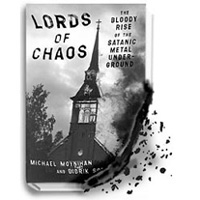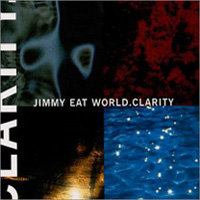 Lords of Chaos
Lords of Chaos
An interview with Michael Moynihan
by Jon Natchez
Michael Moynihan is the co-author (with Didrik Soderlind) of Lords of Chaos: The Bloody Rise of the Satanic Black Metal Underground (Feral House, 1998). Unlike most sensationalistic accounts of the black metal phenomenon, Moynihan presents the reader with an in-depth, multi-faceted text that provokes more questions than it answers. Recently, the book won the Firecracker Award for Best Alternative Music Book of 1998 at the prestigious American Booksellers’ Association Expo. Lollipop talked to Mr. Moynihan from his home in sunny Portland, OR about the making of the book, the subjects of the book, and what lay between the pages.
How did you first become interested in black metal?
I grew up listening to industrial music, which was quite extreme in its own right. After years of that, I was surprised to see that there were these other forms of music, like certain substrata of heavy metal, that came around to that kind of approach in some ways. You started getting things like death metal, which was incredibly violent, and bands like Carcass. I was interested to see that development in heavy metal – I’d always dismissed it as not being that important or being cartoonish. Bands like Carcass started to go for this almost overdose of realism – that was a phenomenon I started observing and writing about in 1990. So I was writing about death metal right around the time black metal came into its own, at least of the Norwegian variety. I was also following trends like Satanism in music and black metal seemed to take up all these strands and run with them to the furthest extreme. As time went on, I started to hear reports about the extra-musical activities going on in Norway and I got even more interested. It was originally going to be only a chapter in a Feral House book titled Apocalypse Rock, about extreme and unprecedented tendencies in modern music. But once I started to research, I got so much material that I decided to do a whole book about it. It was too intense and encompassing to distill down to 20 pages.
Outside of your book, you’re probably best known as the singer and central force behind the band Blood Axis. How did your involvement with that project affect this one?
I would say that it helped, primarily in terms of getting to talk to certain people in the book – some of the black metal people were aware of the band, and that allowed me a certain degree of access. Both the band and this book reflect what I’m interested in – the book is objective, but its content reflects my interests. Black metal had many different currents running through it, and I was interested in all of them. A book on black metal provided an opportunity to talk about these subjects. I didn’t want to misrepresent black metal, but I was able to use the subject to talk about these larger issues, such as Satanism, atavism, Norse religion…
A recurring theme in the book is a criticism of the sensationalized way the media handles black metal. Were yo u trying to provide a different type of coverage?
u trying to provide a different type of coverage?
We genuinely and sincerely set out to write a book that was as objective as we could make it. People might take issue with that, but I think that the end result is far more objective than any media account I’ve seen. For example, I just did an interview with NPR that fulfilled exactly what we criticize in the book. The interviewer wanted to generalize about all these things and sensationalize them as much as possible. It was extremely difficult to convince him that that is not the way it is. He wanted to portray it in a very conspiratorial way, implying that music is making all these kids go out and commit these horrible crimes. We don’t say anything like that at all – I think the book is really balanced in that respect. We wanted to present all these different sides: there’re opinions in there from the bands, sociologists, occultists, theologians, and record distributors. We wanted to talk to different types of people. If readers are given all these different points of view, they can decide who they want to believe, based on who sounds more credible. I didn’t want to make decisions for the reader. I think we tried to present a pretty wide open spectrum, and we didn’t edit things out of interviews because they didn’t go along with what we felt might be the truth of the matter.
In one of the interviews, Samoth from Emperor says, “I think serious, intelligent propaganda is maybe a more effective way to get through to people.” By giving so much space to racial, right-wing ideology, do you feel there’s a danger inherent in the text?
I don’t think it’s a problem. I don’t want to talk down to readers and tell them what to think. The fact of the matter is that those were the things the people were saying. I assume that the reader is intelligent enough to sift through it and decide whether some person is full of bunkum or not. I don’t believe that there is necessarily a right way to look at the issue, and that’s why we tried to present all these different sides – take this thing seriously and let people say what’s on their mind. If you take somebody in the book who’s advocating the most extreme sort of racial right-wing ideology…
 Like Varg Vikernes or Hendrik Mobus.
Like Varg Vikernes or Hendrik Mobus.
Yeah, one of those guys. If you read what they say and then see what they did, I think there are a lot of gaps between the ideology and the real-life actions. I think there’re a number of things in the book that question how seriously someone might take Varg Vikernes, for example. And I assume an intelligent person will read these things and look critically at what these people have to say. I didn’t want to manipulate the reader. Most articles you might read will start from the supposition that Vikernes, for example, is a “bad person,” and I think that’s a far too simplistic view of reality. I think he’s a complex person. I think a lot of his views are ludicrous, others might be reasonable, and you have to sift through them and see what your own reaction is.
What did you find compelling or sympathetic about Vikernes?
When you meet Vikernes in person, he’s an extremely charming person. On a personal level, he’s likable. He’s smart, he’s witty, he’s very amiable and congenial; he was one of the most enjoyable people to talk to. On the other hand, I think a lot of the things he says are very dubious, and I think that’s brought to light in the book. I think he’s quite good at presenting a kind of revisionist interpretation of his own past, making this mythical figure of himself, and I think that’s one of the most interesting things about him. It’s fascinating to see how he takes the things that he did, for some certain reason, and recontextualizes them later as having been done according to a more elaborate ideology. We present some things that make his mythology look questionable when you see the bigger picture. But I can sympathize with Vikernes on a number of levels.
 What made the reactions of Vikernes, and others, so extreme?
What made the reactions of Vikernes, and others, so extreme?
There were a few different things going on, and I don’t want to over-generalize it. I would never claim that I know the reason why this thing or that happened. I think there are a lot of reasons. When you create a social structure like Norway’s, maintained for generations and generations, you inculcate this certain degree of boredom into people. Some people start to lose the feeling that there’s any meaning in existing. I think that’s one explanation why things took on such a virulent cloak in Norway. As far as the gravitation towards a harsher racial or nationalistic outlook, I think some of that is just for shock value. At a certain point, black metal defined itself by being Satanic music. They burned down churches, and it was making national headlines. But after a while, after it had been identified in the media, it became kind of passé. The media sensationalized it to a huge degree, and after a while, when you’ve read screaming headlines about churches being burned down by Satanists over and over again, it becomes sort of mundane. For those astute at figuring out how to get attention and shock the public, the Satanism was losing its effect. So some gravitated towards the nationalist imagery. In Norway, that’s a really touchy subject because Norway had a difficult history with Nazism in WWII. Norway was occupied by the Germans, and that’s something Vikernes plays upon to a certain degree. He’s very good at pushing peoples’ buttons, and I think he’s well aware of that when he says those kinds of things. He’s definitely, on some level, making himself into a pariah.
You frequently mention the wide variety of musical styles and ideologies in black metal. Is this another thing you feel has been ignored by mainstream media coverage?
Most people want to lump everything into one category, like this guy on NPR who kept referring to all black metal as Satanic, fascist and violent – that’s not the case at all. I’d repeat over and over again that he was making a completely erroneous generalization. You have bands advocating the most primitive, retrograde form of Satanism that’s impossible to take seriously, then you have people like Ihsahn from Emperor who actually has a pretty coherent ideology that sounds reasonable when you speak to him about it. He can explain why he thinks certain things and a lot of it isn’t that different from a Libertarian outlook. So you have this huge variety of beliefs, with everything between those two extremes just in the realm of the Satanism alone. The only thing you can say that is across-the-board true of black metal is the anti-Christian thrust of it. I think that’s there no matter what other ideology the bands might espouse, or what image they might present.
 What caused this great divergence of styles and ideologies?
What caused this great divergence of styles and ideologies?
There’s one really clear explanation for this. When the genre started out, most of these kids were 14, 15, 16 years old, but it’s now eight or nine years later, and I think they’ve evolved and matured to a huge degree. In the beginning, these people were trying to uphold this strict image of what they thought black metal should be like, which, to a certain degree, was set by Euronymous. I think that in the earlier stages, Euronymous was really looked up to by these younger people who got involved in the scene. Mayhem had been around for much longer, since 1985, so they were the standard bearers. They set the style and the sound of the genre. But that changed as people got older, more independent, and weren’t 15-year olds trying to fit into a group anymore.
The one thing all of the interviewees from the original black metal bands seem to be in agreement on is an aversion to the scene today.
A lot of that comes from the media aspect of it, actually. The black metal scene was really sensationalized, and then came these waves of bands that aspired to nothing but imitating the bands that already existed. During the first wave of bands in Norway, you had groups who were really defining their own styles – Emperor, Mayhem, Burzum, Immortal, Enslaved, there’s a number of them. It must have been a very vibrant, exciting thing. Then you had the second wave after the huge, sensationalist media explosion. Pretty soon, there were bands from all over the world – you had bands in Taiwan playing “Viking Black Metal,” and bands from Brazil with Norwegian names and stuff like that. The whole scene had lost some of its meaning.
As it’s become more mainstream and theatrical, have all traces of ideology vanished?
I don’t think all the ideology has left. But it becomes harder to take some of it seriously – a lot of it is just rhetoric, just an image. The more intelligent people in the scene have sincere beliefs, and I don’t think their beliefs have changed so much, but they’ve evolved and matured over the years. The anti-Christian element of it and the rebellious element are just as true as ever. Even if it’s mainstream, those elements are still important.
 How mainstream has it become?
How mainstream has it become?
The music is still too extreme and the ideology is too uncompromising to ever be significantly marketed by mainstream record labels. I think they’d rather sell other things that are less troublesome. But on the other hand, in Europe especially, the music has gained levels of popularity that it never had before when Mayhem was putting out 100 copies of their demo or 1000 copies of their first record. You have bands now like Dimmu Borgir – I heard that they just played live on television for the Norwegian equivalent of the Grammy awards, and that their last record has sold over 150,000 copies worldwide. That’s an incredible amount of records for anybody, especially coming from a place like Norway, which in terms of the international music business is an almost insignificant place.
One of the unique features of black metal seems to be the level of commitment that even the original participants still have to their music.
Most of the bands, even Mayhem, are still around, despite the unbelievable things they’ve had to deal with. In Mayhem’s case, for example, the deaths of Euronymous and Dead. Three-quarters of Mayhem today were in the band then: Maniac, Hellhammer, and Necrobutcher. Their new EP is as good as anything they’ve ever done. There’s an intensity, a certain kind of artistic defiance, that will continue on. It’s amazing that almost 10 years later, there’s still that intensity. Musically, it’s kind of revitalized heavy metal, which up until the early 1990s was heading towards arena rock and stuff like that. Black metal brought it back down to Earth and kind of popped its bubble, made it much more aggressive, innovative, and unusual, without having the same kind of commercial aspirations. Also, the black metal bands, even the popular ones, haven’t sold out to mainstream culture. If you take the new Emperor record, you can hear elements of traditional heavy metal in it, but it’s definitely a black metal record. Ulver is similar, managing to incorporate all these unusual elements into the music. I think most music genres are happy to go along and never change, just offering the same cheap thrill, whereas in black metal there is a degree of experimentation and open-mindedness. But I have to point out that for every good band, there are probably 500 bad ones that play the same two chord noise.
 What do you see as the future of black metal, especially here in the U.S. where it is still very much a nascent trend?
What do you see as the future of black metal, especially here in the U.S. where it is still very much a nascent trend?
Metal has a stigma here in the States. In the early ’90s – and I don’t know exactly what the reasons for this are – metal was squeezed out of the picture in America. There was still a heavy metal scene up until that point. You actually used to have Headbanger’s Ball on MTV, and they started to show fairly radical videos as far as metal goes. I remember seeing bands like Morbid Angel on the program. And then, all of a sudden, it was taken off the air entirely. And when that happened, metal really went underground. You saw the more extreme forms come to flower, when there wasn’t an outlet for them anywhere else. So it’s hard to say what’s going to happen in America. Black metal could easily become just some sort of trend that’s popular for a year and then gets marginalized again. In Europe it seems to have definite staying power.
Some of the most challenging parts of the book are the discussions about the collective unconscious and cultural archetypes. Could you talk a little about the connection, as you see it, between black metal and pre-Christian European cultures? Also, what form might black metal take in a country like America, with no ancient history that a majority of the population feels a connection to?
Some of the most interesting parts of the book, as the writer, were the parts that talk about possible atavistic explanations for the things that happened. It’s interesting to ponder whether there are forces at work in the world beyond the mundane materialistic version of reality that’s presented in everyday culture. There are huge numbers of people in the world who are happy to ascribe any kind of event like the things that happened in Norway or the Columbine shootings to the work of “The Devil.” If these people believe that kind of logic, I don’t see why there’s any reason to rule out the idea of forces other than simplistic, dualistic Christian ones. I’m not saying I believe that’s what happened, but I think that there’s interesting evidence.
I think there’s definitely a problem in America – you have this society that doesn’t have any real identity. It’s a recently developed country founded by immigrants. You don’t have the tie back to your ancestors and your ancestral culture that you have in places like Scandinavia, all over Europe, and in most parts of the world. I mean, you started to see a similar phenomenon in places like Japan – you had black metal bands that realized, “Oh, we should be singing about ancient Japanese history, not Vikings.” And they started to do that. There’s a band called Sigh from Japan – they used Japanese imagery on their records and took cues from Shinto. But here in America, it’s hard to say. Because people have really lost ties to their past, you have a lot of alienated people. You get much more aimless and confused outbreaks of violence. You get things like kids in Littleton, Colorado just killing people at random. You don’t see people burning down churches according to any kind of deliberate campaign.
 Especially after the Columbine incident, “dark” music’s effect on kids is once again a hot topic of debate. How much of a threat is black metal?
Especially after the Columbine incident, “dark” music’s effect on kids is once again a hot topic of debate. How much of a threat is black metal?
The music reflects a type of alienation. The music is really an expression of it, and this is where I part ways with the people who’ll try to say, “The music made these kids do it.” It’s faulty logic to say that, whether it’s black metal bands or Marilyn Manson or whatever. The music can be a kind of safety valve that lets off steam. I mean, there are 150,000 people buying Dimmu Borgir records; they’re not all going out and committing murders and burning down churches. If Marilyn Manson were really causing people to go out and commit crimes, you’d see a crime wave across the entire country every time they went on tour. On the other hand, I think you’re going to see more and more people who are incapable of letting it off in any safe way. I don’t see how the alienation is going to decrease with the way the civilization is going right now. There are an incredible number of alienated people in modern civilization, in the modern world, who don’t see any point to existence. So you’ll see people who will try to find something that’s more real and more visceral, and they’re going to do it in unpleasant ways.
You end the book in a puzzling way, referring to black metal, and Varg Vikernes especially, as “bearing the mark of symbolic truth.” Could you explain this a little more?
I think there are forces at work in the world that aren’t easily defined or quantified. I believe that there is a certain human spirit, or soul, or whatever you want to call it. There is some kind of irrepressible aspect to human life that is going to react against things that try to overly control it, or restrict it, or funnel it into something that is by its nature soulless or boring. In a place like Norway, where there’s a society that’s basically static and and doesn’t offer any real excitement, you’re going to see that sort of force erupt. And it’s the same with American society.
 In the modern world, there are a few ways in which people become alienated. First, we live in a society where people only experience things by proxy – for excitement they watch movies or they listen to records, whereas their real life is driving back and forth from their jobs. Before the modern era, before mass media and mass entertainment, there was more of a struggle in day-to-day existence, a struggle that let you know you were alive. Second, identity has been lost in our increasingly commercial world where a person is reduced to a number, only seen in terms of contributing to the economy and distribution of leisure time. Third, we’ve increasingly lost any sense of ethnic identity. Modern global mono-culture has made it so that people don’t know where they come from. And if you don’t know where you come from, you have no idea where you’re going. There’s a percentage of human beings who are not going to tolerate this situation, and who are going to strike back against it. That’s an inherent fact of life, and that’s what I mean about it being “true.”
In the modern world, there are a few ways in which people become alienated. First, we live in a society where people only experience things by proxy – for excitement they watch movies or they listen to records, whereas their real life is driving back and forth from their jobs. Before the modern era, before mass media and mass entertainment, there was more of a struggle in day-to-day existence, a struggle that let you know you were alive. Second, identity has been lost in our increasingly commercial world where a person is reduced to a number, only seen in terms of contributing to the economy and distribution of leisure time. Third, we’ve increasingly lost any sense of ethnic identity. Modern global mono-culture has made it so that people don’t know where they come from. And if you don’t know where you come from, you have no idea where you’re going. There’s a percentage of human beings who are not going to tolerate this situation, and who are going to strike back against it. That’s an inherent fact of life, and that’s what I mean about it being “true.”



